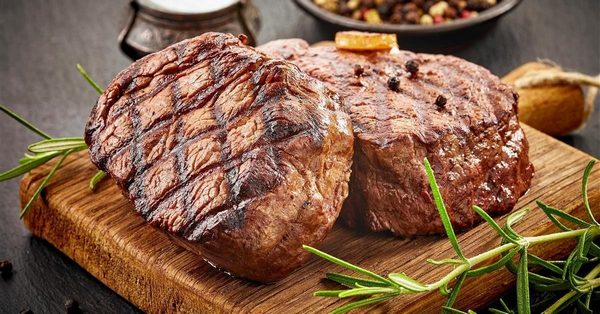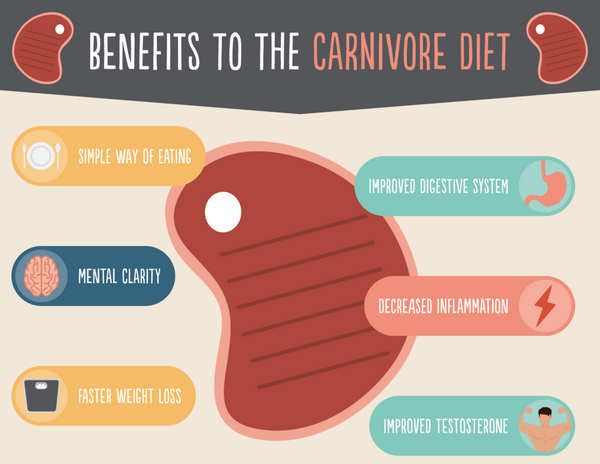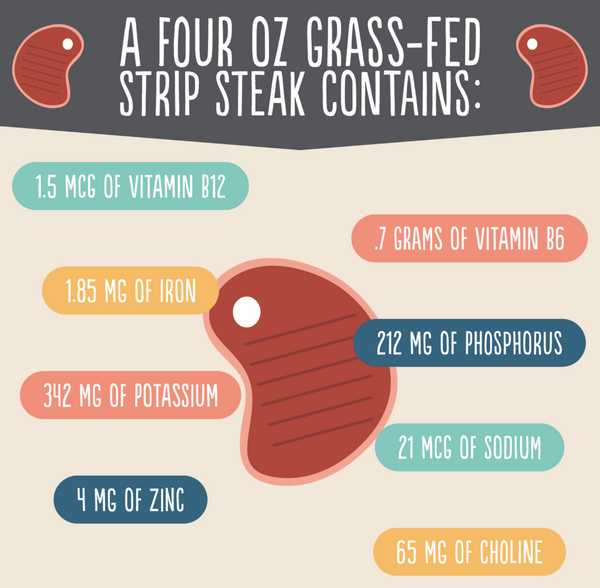
Carnivore Diet Plan Recipes And Benefits
The Carnivore Diet: Can Eating Only Meat Supercharge Your Health?
The carnivore diet is currently one of the most buzzworthy nutrition trends encouraging people to eat meat and stay away from everything else.
It’s become one of the most controversial diets to date and for good reason.
After all, we’ve been taught that meat is an unhealthy, disease-inducing, artery-clogging food that should be avoided at all costs.
But with the emergence of people reporting an increase in energy, drastic weight loss and mental cognition, it’s extremely tempting to at least look into what the research has to say.
What is the Carnivore Diet?
The carnivore diet protocol is simple, eat only animal foods and stay away from everything else.
This means you’re restricting all types of carbohydrates and even requires you to eliminate plants from your diet.
It is the complete opposite of a vegan diet.
Similar to a ketogenic diet, the carnivore diet relies heavily on running off fats and proteins as a source of energy.
While science has steered us away from heavy consumption of meat and more towards a plant-based approach for optimal health, the overwhelming amount of positive benefits people are experiencing may make this way of eating a promising tool for better health.
And for many of the same reasons people choose to try a ketogenic diet, people who have adopted a carnivore way of eating have reported mental clarity, faster weight loss, improved athletic performance and a healthier digestive system.
The simple approach also makes it alluring for anyone who’s looking to follow a diet without having to dive deep into any complication nutrition tactics. This means you won’t have to worry about counting macros or calories, timing your meals or intermittent fasting.
All you have to do on the carnivore diet is eat animal foods (including dairy) and stay away from everything else.
You should avoid
- Carbohydrates. From candy to vegetables, any carb source is 100 percent restricted from the carnivore diet.
- Supplements. All supplements should be avoided. The theory behind the carnivore diet is that all of the nutrients and minerals your body needs to thrive is contained in animal foods.
You are allowed to eat
- Meat. Beef, fatty cuts of steak and red meat are the staples to this diet. Since you aren’t consuming any carbohydrates, you should be getting the bulk of your calories from fattier meat to ensure you’re getting enough calories to maintain stable energy levels.
- Dairy. Technically dairy coming from animals like milk, butter and cheese are allowed on the diet but many carnivore dieters try to limit dairy since lactose intolerance has become increasingly common.
- Animal Fat Products. Lard, tallow and other animal-derived fats are encouraged to be consumed on the carnivore diet.
- Fish. Any type of fish is allowed although fattier cuts of fish like salmon and halibut are preferred.
The carnivore diet bases its ideologies on similar studies the ketogenic diet looks to.
For example, researchers at McMaster University published a study demonstrating that people who eat high quantities of carbohydrates had a 30 percent higher chance of dying than the participants who were eating a low carb diet.
People eating a high fat diet had a 23 percent lower risk of mortality during the seven year study compared to the people who ate less fat.
Promising studies like this paired with the multitude of positive results reported by carnivore dieters worldwide makes it a diet worth trying.
Sample Carnivore Diet Meal Plan
The carnivore diet is very simple and encourages you to consume meat-only products everyday.
Here is a quick sample meal plan:
- Breakfast — Scrambled eggs with bacon and black coffee (or with whole milk)
- Lunch — 80/20 grass-fed ground beef and water
- Dinner — Porterhouse or T-bone steak
History of the Carnivore Diet
What makes the carnivore diet even more enticing is its historical background. The human population has never lived through a time where eating a strictly plant-based or carbohydrate heavy was ever followed from the rise to the fall of any civilization in history.
But if we take a closer look at what our ancestors ate, there are multiple populations throughout different ethnic and geographical backgrounds who have adopted a carnivore diet for multiple generations.
Our carnivore ancestors include:
- Nomads from Mongolia who thrived on meat and dairy.
- Masai from East Africa who’s primary diet consisted of meat and milk.
- Gaucho Brazilians who consumed mostly beef product.
- Russian Arctic Chukotka who nourished their population with fish, caribou and marine animals.
- Canadian Inuits who lived solely on walrus, seal, whale meat and fish.
Many of our carnivore ancestors not only survived, but also displayed strong health markers.
For example, our Point Hope Eskimo ancestors followed a strict animal-only diet consisting of walrus, whale and sea cultures where 50% of their caloric intake was from fat and 35% from protein.
Researchers found that incidences of heart disease from the Point Hope Eskimos were ten times lower than the Caucasian population of America. Additionally, their triglyceride levels averaged 85 mg/dL as compared to the U.S average of 100 mg/dL.
And despite the rise in vegan diets, there is significant evidence supporting that our ancestors were meat eaters.
How Does the Carnivore Diet Work?
By nature, animal foods are zero carb. When we restrict carbohydrates from our diet, our need for certain nutrients are decreased.
We don’t require several vitamins that are involved in carbohydrate metabolism when we are consuming an all-meat zero-carbohydrate diet.
One study in particular took a further look into vitamin A and its effect on macronutrient metabolism. The study concludes that in the absence of carbohydrate, vitamin A requirements were no longer imperative for metabolic regulation.
When we eliminate carbohydrates from our diet, our body looks for other sources of energy and will eventually enter a state of ketosis where your body is using primarily fats for energy via ketones.
Running purely off fats for energy via ketosis is our body and brain’s preferred energy source and comes with several health benefits.
Difference Between the Ketogenic Diet and the Carnivore Diet
Both the ketogenic diet and the carnivore diet allow fats and proteins while completely eliminating carbohydrates.
But the carnivore diet takes it one step further and is considered to be more restrictive to the already prohibitive ketogenic diet.
With the ketogenic diet, you are still encouraged to eat large amounts of plant foods along with non-animal fat-dominant foods like nuts, coconut oil and avocados.
The ketogenic diet emphasizes a high fat intake while eating a moderate amount of protein. This is because the main goal is to start using ketones as a source of energy.
Unlike the ketogenic diet, there are no macronutrient ratio preferences in the carnivore diet, although you can certainly reach ketosis.
Whereas a keto diet recommends 60 – 70% fats, 20-30% protein and 5-10% carbs — the carnivore diet has no macro ratio requirements — sticking to only animal products is the priority of this way of eating.
Some dairy foods are not permitted on the ketogenic diet because of the higher carb content, it’s permissible on the carnivore diet as long as it’s derived from animal sources.
Benefits to the Carnivore Diet
Many of the benefits that come with eating a meat only diet are similar to the ketogenic diet. This could be due to the complete restriction of carbs and allowance of higher fat intake.

#1: Simple Way of Eating
Much of the intrigue to the carnivore diet is due to its extremely simple protocol. Everyone knows what food comes from animal sources and what doesn’t.
If you often get confused with macronutrients, counting calories, meal timing and prep, then eating a meat-only diet can be a great way to begin dieting.
While it may sound like a costly lifestyle, meat is known to be very filling and you’ll find yourself going for long periods of time without craving food.
#2: Improved Digestive System
Fiber has been a staple in just about every diet and has been promoted as a way to improve your body’s digestive system.
But the carnivore enthusiasts propose a different outlook and may have the science to back it up.
Carnivore dieters believe that cutting fiber out of your diet may actually improve any digestive distress.
One study by the World Journal of Gastroenterology looked into the effects of decreasing fiber intake in people who were experiencing constipation, which is the opposite of what we’ve been told to do.
The results showed that those who ate no fiber saw a large improvement in their digestive issues including less bloating and gassiness. They even began to see an increase in bowel movement.
#3: Mental Clarity
Similar to the ketogenic diet, carnivore dieters experience an increase in focus and mental clarity almost immediately.
Our brain is made up of nearly 60 percent fat so by following a diet composed of mostly fats and protein, it’s common to begin experiencing longer bouts of focus and an improved mood.
Studies have shown that by restricting carbs and using fats and proteins as the majority of your daily caloric intake has strong neuroprotective properties that will help you focus better and tolerate stress more efficiently.
#4: Decreased Inflammation
One study compared inflammation markers between a low carb, high fat group to a low fat, high carb group for 12 weeks.
The results show that the low carb, high fat dieters had lower systemic inflammation by the end of the 3 month study.
#5: Faster Weight Loss
If losing weight is your main goal, adopting a meat only diet will help you maintain steady levels of blood sugar due to a lack of carbohydrate.
A large reason why your body accumulates fat is because your body isn’t insulin sensitive. This means anytime you eat carbohydrate, it’s converted into fat rather than used for energy.
Completely restricting carbohydrate will improve your insulin sensitivity.
Additionally, eating meat and maintaining a low carb high fat diet regulates your body’s hunger hormone which keeps you satiated for longer periods of time without craving sweets every couple hours.
#6: Improved Testosterone
Diets that are high in fat have been proven to increase testosterone levels.
One study found that men who adopted a low fiber, high fat diet for two months had a 13% higher testosterone compared to the participants following a low fat diet.
Frequently Asked Questions
Does it Work for Athletes?
While there aren’t many studies proving the effectiveness in athletic performance when restricting carbohydrates and following a strict carnivore diet, many carnivore dieters have reported improved strength gains.
There is an induction phase your body must go through before it can effectively utilize meats as energy.
If you are an athlete who performs high intensity exercise such as sprinting, the carnivore diet may not be the most effective diet to follow.
A targeted or cyclical ketogenic diet may help improve your athletic performance better.
Will This Cause Any Micronutrient Deficiencies If I Don’t Eat Vegetables?
There is large concern for restricting vegetables from your diet because they are known to have high nutrient density.
Red meat contains large amounts of vitamins and minerals especially if it was from a grass-fed animal.

One nutrient in particular that people worry about is vitamin C. And while meat isn’t a great source of vitamin C, Dr. Stephen Phinney, author of The Art and says that when you remove carbohydrates from your diet, it decreases the need for vitamin C.
Is the Carnivore Diet Safe?
This isn’t a 100% black-and-white yes but since it’s very similar to a ketogenic diet, the carnivore diet appears to be safe for most people.
One of the concerns people have is having an increased risk of heart disease due to the saturated fat content of a meat-only diet.
But recent reports have shown that saturated fats are not the culprit for heart attack and sugar is the leading cause of heart disease.
However, there are no long term studies on the carnivore diet for longevity but seeing as how so many of our ancestors have followed this way of eating with much success, it’s hard to believe that eating a meat only diet can be anything but safe.
How Long Does it Take to Adapt to the Carnivore Diet?
Everyone has a different level of metabolic flexibility. This is your body’s efficiency in switching from one main energy fuel source to another.
Anecdotally, many people begin experiencing the benefits of the carnivore diet after two to three weeks of eating strictly meat.
Others have reported up to three months, especially as an athlete who has been primarily running off carbohydrates for energy.
The Carnivore Diet May Be a Worthwhile Nutrition Regimen
While at first it may sound crazy to eat only meat, the overwhelming amount of anecdotal testimonials proving an increase in focus, significant weight loss and improved mood makes it hard not to at least give the diet a try.
And since many of the carnivore diet principles follow the principles of a low carb, high fat ketogenic diet, it looks to be a compelling diet especially for those looking to lose weight.
Meat is not as unhealthy as the mainstream media has made it out to be and as more research is published, the blame should be focused more on sugar and processed carbohydrates.
Any diet that restricts empty calories from carbohydrates will benefit your health and the carnivore diet does just that.
After all, who wouldn’t want to follow a diet that lets munch on juicy steaks while helping you lose weight?











